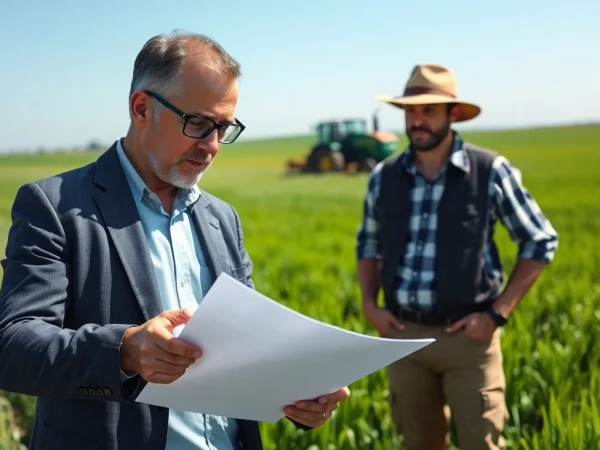Key Considerations When Hiring an Agriculture Lawyer for Your Farming Needs
Understanding the Role of an Agriculture Lawyer
What is an agriculture lawyer?
An agriculture lawyer specializes in legal matters related to the agriculture sector, encompassing a wide range of issues that farmers, ranchers, agribusinesses, and landowners may face. Their expertise includes areas such as contract law, property rights, environmental regulations, and agricultural labor. These attorneys play a crucial role in advocating for their clients’ interests while navigating the complex legal landscape of agriculture.
Common legal issues in agriculture
Farmers and agribusinesses encounter unique legal challenges, including:
- Water Rights: Accessing and managing water resources is critical for agricultural operations, often leading to disputes over rights and usage regulations.
- Land Use and Zoning Regulations: Understanding local zoning laws is essential for farmers to ensure their land is used efficiently and legally.
- Pesticide and Herbicide Regulations: Compliance with environmental laws regarding pesticide use can help prevent legal action and ensure public safety.
- Labor Laws: Agricultural workers are governed by specific labor regulations, and farmers must comply with employment laws to avoid penalties.
- Product Liability: If agricultural products cause harm to consumers, farmers may face lawsuits and liability claims.
The importance of specialization in agricultural law
Due to the unique nature of the agriculture industry, specializing in agricultural law is essential. Laws vary significantly by region and can be influenced by federal and state regulations. A specialized agriculture lawyer can provide the knowledge necessary to navigate these specific challenges effectively. Their deep understanding of agricultural practices and legal requirements equips them to offer tailored solutions that protect farmers’ interests.
Key Qualities to Look for in an Agriculture Lawyer
Experience in agricultural practices
When selecting an agriculture lawyer, experience is of utmost importance. Attorneys who have worked directly in the agricultural field or have substantial knowledge about agricultural practices will better understand the specific issues that farmers encounter. They can provide insights and strategies that general lawyers may not be aware of, making them more effective advocates for their clients.
Knowledge of local laws and regulations
The agricultural landscape is shaped by various state and local laws, which can differ widely across regions. An agricultural lawyer must possess comprehensive knowledge of these laws and how they relate to the specific agricultural activities in their area. This localized knowledge enables the lawyer to draft contracts, handle disputes, and advise clients with a firm understanding of the legal framework governing their operations.
Strong communication and negotiation skills
Effective communication is critical in legal representation. An agriculture lawyer should be able to articulate complex legal concepts to their clients in understandable terms. Additionally, strong negotiation skills are essential, particularly in contract discussions or when addressing disputes. A lawyer who can negotiate effectively can save their clients time and resources while achieving favorable outcomes.
How Agriculture Lawyers Assist Farmers
Contract negotiations and drafting
Agricultural contracts can cover a wide range of agreements, including sales, leases, and employment. An agriculture lawyer assists clients by drafting these contracts to ensure they are comprehensive and legally binding. They will work to protect their clients’ interests by including provisions that address potential disputes, compliance with regulations, and specific terms related to agricultural practices.
Handling land use and zoning issues
Land use is a significant factor for farmers and agribusinesses. An agriculture lawyer can advise clients on zoning laws and land use regulations within their region. They help farmers navigate applications for zoning variances and ensure that land developments comply with local and state laws. By doing so, they aid in maximizing the value and utility of agricultural properties while avoiding legal conflicts.
Dispute resolution and litigation
Disputes in agriculture can arise from various issues, including contractual disagreements, land use, and liability claims. An agriculture lawyer plays a critical role in dispute resolution through mediation or negotiation, working towards a solution that avoids the lengthy litigation process. In cases where litigation is inevitable, the lawyer will represent their clients in court, employing their expertise in agricultural law to advocate on their behalf effectively.
Costs and Fees of Hiring an Agriculture Lawyer
Understanding different fee structures
The cost of hiring an agriculture lawyer can vary depending on their experience, the complexity of the case, and the services required. Common fee structures include hourly rates, flat fees for specific services, or contingency fees. Understanding these structures is vital for farmers to budget appropriately and ensure they receive value for their investment in legal representation.
Estimating costs for legal services
To estimate potential legal costs, clients should seek initial consultations with multiple agriculture lawyers. During these consultations, they can discuss the nature of their legal needs and obtain estimates based on the solicitor’s fee structure. Additionally, clients should inquire about any extra costs that could arise during the process, such as filing fees or additional legal services that may be required.
Budgeting for agricultural legal issues
Farmers should establish a legal budget to accommodate potential legal issues that might arise unexpectedly. This budget should factor in the costs associated with routine legal services, such as contract reviews or zoning compliance, as well as contingency funds for litigation or other disputes. By being proactive in legal budgeting, farmers can avoid financial strain when legal challenges occur.
Finding the Right Agriculture Lawyer for Your Needs
Researching potential candidates
When seeking an agriculture lawyer, conducting thorough research is critical. Start by seeking recommendations from fellow farmers, agricultural cooperatives, or industry associations. Additionally, online legal directories can provide insights and ratings for lawyers specializing in agricultural law, allowing potential clients to compare candidates based on their qualifications, experience, and client reviews.
Questions to ask during consultations
During initial consultations, clients should ask pertinent questions to gauge a lawyer’s suitability for their needs. Useful queries include:
- What experience do you have with agricultural law?
- Can you provide references from previous agricultural clients?
- What is your fee structure, and can you provide an estimated cost breakdown?
- How do you typically handle disputes in agricultural cases?
Utilizing referrals and online resources
Referrals from trusted sources can be invaluable when selecting an agriculture lawyer. Farmers can also leverage online resources, such as legal aid organizations or agricultural law forums, where they can find information and recommendations for reputable lawyers. These resources can guide farmers in making informed decisions about legal representation suitable for their needs.






